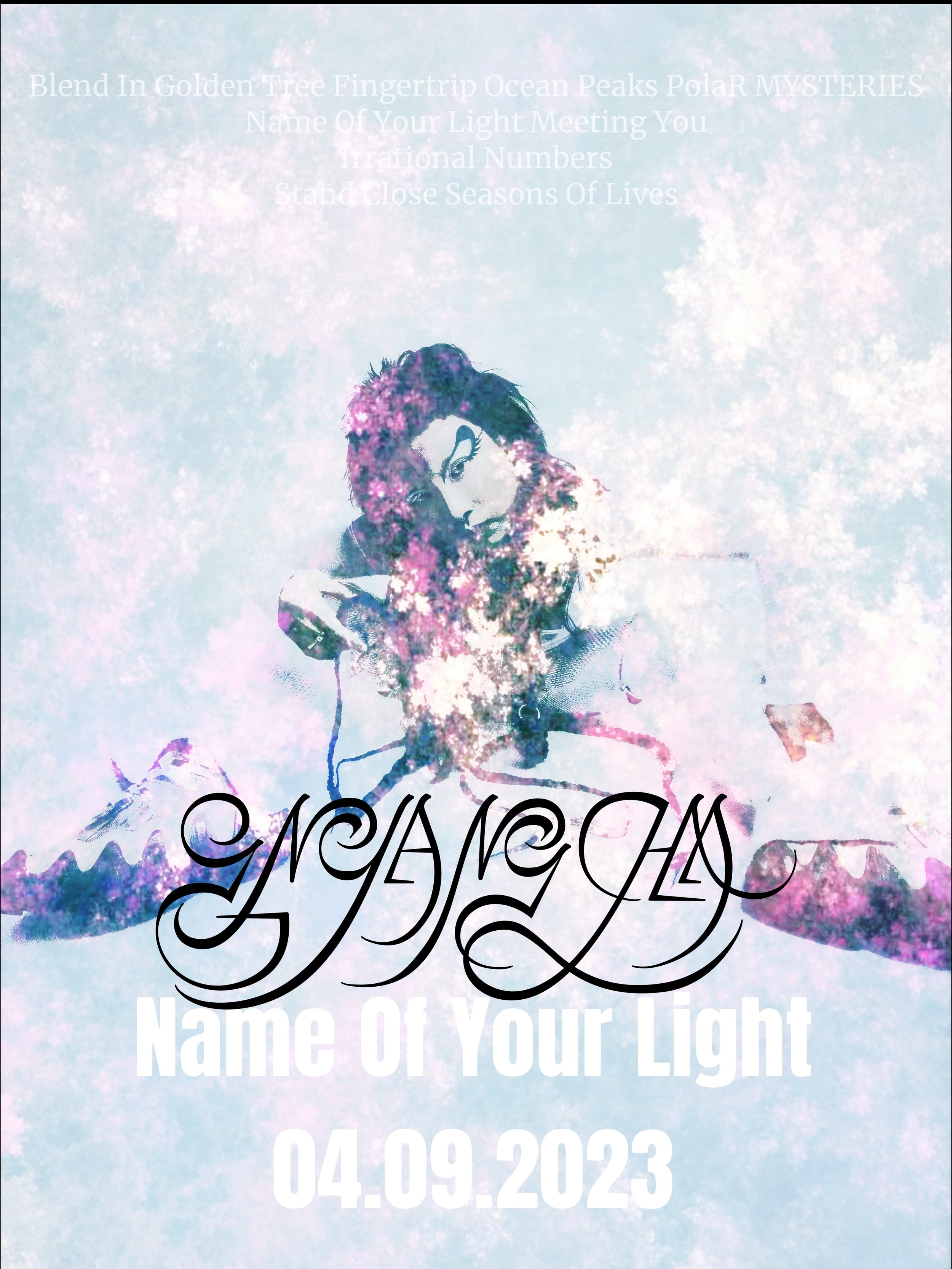Aisha Devi
Growing up under the shadow of isolation and abuse, Devi formed her practice as a healing method, using it to neutralize her past and recreate an alternate, more hospitable reality – beyond the human condition. Her feelings were compounded when she tracked down the whereabouts of her father B.K. Gurung. We spoke to her about her new album ‘Death is Home.’
Devi’s words and productions reach out to a place where weightlessness has the power to dissolve the corporeal world’s manufactured terror of death. Without this trepidation, life’s boundaries and limitations fall away. “Burn the flesh, a Deva’s born,” she sings over tense, pneumatic kicks on ‘Not Defined by the Visible’. Her voice is contorted by electronic processes, but the meaning is human: to reach the holy, we must shed our skin. The narrative that guides the album unfurls with the plasticity of an open-world videogame, a space where one can unravel the dogma of life vs. death. On ‘Lick Your Wounds’, Devi reveals her deepest trauma, pacifying it with rousing, ritualistic rhythms and melancholic pads. “Vapors of violence remain in my broken bones, intoxicate my DNA,” she invokes. “I’ll lick my wounds and heal at night. I’ll take over.” She extends this invitation to anybody tuned in to her signals, providing lodging for those that crave it. Birth is virtual. Death is Home.
The video of new single ‘Mind Era’ Devi unfolds that exploration. She collaborated with Nepali Indigenous artist Subash Thebe Limbu who recently exhibited work at Tate Modern in London. They shot the video in the Himalayan county of Nepal. The director explains:
“The video project is based in the Himalayan region of Nepal that we both, Aisha and me, share a connection with. We started this project with conversation around homecoming, journey, lights, rituals and belonging. This work explores these themes with images from picturesque places in Nepal but with very different framing and aesthetics unlike the touristic snapshots we are usually accustomed to.
The people, colours, lights, speed and also the choice of locations; they all have connection but the work as a whole is a subtle narrative without details; it’s like a journey; a fleeting experience you never want to let go. Backed by amazing production team lead by Rashik Maharjan in Nepal, we shot mostly in Kathmandu valley, Bandipur, Begnas and Pokhara.”
Devi also added: “My unknown father became known and dead at the same time. Mind Era is an identity and initiatic journey through Nepal, following the traces of Basant Kumar Gurung, a homecoming where life and death become symbiotic and expressions of the same essence. Mind Era is a syncretic principle of enlightenment.”
Devi, quite literally means goddess. The first time when I was introduced to your music in 2018, I instantly felt transported to a temple with a ritualistic setting. Later upon studying about you and your work it was a full circle moment. Could you take us through your creative space, what is it like to work through such power and what it took for you to release the very first EP you had released back in 2013?
There's a Devi inside each of us, and I think my audience embraces their absolute devi-ness too.
Back then, "Aura For Everyone" already encapsulated the intention to trigger a collective transformation, I knew that I wanted to induce enlightenment via music. This ongoing motto defined my relationship with music and orientated the knowledge I gathered in order to create the potent elixir. I now produce music, integrating both syncretic knowledge and sonic methods I developed. I also create in an augmented state of consciousness to be able to activate the listener’s own trance, as a kind of a modern shaman or a superconductive substance that can heal the human spleen.
Coming on to your art of electronic music, I wonder about the artists that you were set aback by when you first began exploring and experimenting? Will you be able to take us through that particular phase when you first acknowledged that music is what you are meant to do? How did AISHA DEVI come to life? Any pivotal moments you could share with us ?
I started music as an urge for expression. a quasi survival instinct. My whole childhood has been violence and isolation. I think I broke the circle of abuse, I broke the silence and I started to heal when I began making music. From a new personal language would emerge a whole parallel universe, an entire animated world where I would evolve freely, my therapeutic alternate reality. My medicine was the act of creating and the music itself. The electrifying moment was realizing that music is the essence of all matter and non matter manifestation. I’ve been experimenting and developing methods since, a kind of a frequency technology that could impact energetically and atomically. Reorder and balance everything and everyone.
To me producing music is an act of self creation, an alternative energy to a preconditioning system, a healing and an exit from our oppressive current 3D.
Now when it comes to spirituality and music, it's a no-brainer that music evokes the spirit and influences materiality, However, Very few are working through this specific intention and purpose of it, Mostly we see this happening in psychedelic rave scenes. On the contrary, your work exuberates a blend of the East and West with a concentrated contemporary and peculiar direction. What inspires and influences you? How did you discover the niche that you are, Is it mediumistic?
I’ve fathomed the importance of transcendence throughout our human history, studying metaphysics and ritual practices around the world. These practices were extensive until colonization. It is still performed minorly in ancestral rituals and in general, the word transcendence scares the Western world. Transcendence is the corporatization and the realization that we exist outside a physical reality, transcendence is the umbilical cord with the beyond and our attestation of immortality. In a hyper-materialistic society, the idea of transcendence is completely counter-productive and I think people who induce transcendence are seen as perturbators. I like the idea of being a madman, a disturbing revelator of the above.
You are considered the Goddess of cybernetic-conscious music by many. I felt you are a “mediumistic artist anchoring and circulating the deity consciousness through contemporary compositions' What do you have to say?
That’s nice, thanks. I send signals to an audience that wants to unfold and project into higher alternate universes. There is an invisible link with people who listen to my music or come to a show, an ongoing active resonance where each anima amplifies each other. Consciousness is a living matter that we can magnetically activate between us. I want people to explore their inner powers and regenerate their sense of eternity that was completely shattered by capitalism. I produce Aetherave with the clear intention to dissolve spacetime and gravity, generating access to the quintessence, the plane where conscious and unconscious connect, like a caduceus.
Your recent LP “Death is Home” is ultimately a manifesto. It's your most revealing work to date and a direct result of your evolution. What made you produce this album the way you did, especially after five years? What was your mental and emotional state through it all?
'Death is Home' is my philosophical take on Socrates' concept of uncertainty, a metaphysical traité calling for a spiritual decolonization and my hail to my unknown late father, Basant Kumar Gurung. I have experienced death as a free territory for imagination and fantasies. Even dead, my relationship with my father has always been a golden thread that has guided me through darkness. So the Western concept of death, loss and desperation has been completely morphed into a superpower, a land of abundance where I can go beyond the blue and come back. I think my genesis has completely merged into my experiments and vice versa, this record is the unification between a personal quest and a universal spiritual answer.
How would you describe your relationship with the ethereal and esoteric? Please help us visualise your studio environment and a regular day of your life. How was your lockdown?
Lockdown on my end had been quite liberating and I took the moment to detach from the matrix. I have the feeling a lot of people experienced the void through introspection and came back with new and wider beliefs. Of course, the system didn’t change so much in the meantime and the reinsertion was fueled by depression and mental health issues. The readaptation to this limited world is impossible as the illusion has been uncovered. I think we’ll have to reform the whole system, to me the only way is the energetical way, what people call esoteric, magic and paranormal is just physics, but people only believe in what they see.
Quoting a subtitle of a movie by Sidney Lumet says “This is not a psychotic breakdown but a cleansing moment of clarity”. Your music touches on such a notion. Your work helps transcend and heal the three-dimensional suffering. Who would you give credit to for your futuristic vision and motivation?
This is referring to a trance state, when the brain is unable to compute any information, a magnetic field will enlighten the mind with clairvoyance. I love that chaos can generate extra lucidity and light, it’s a process I’m using for my live show. Any revelation needs a collision, a purge and a reset.
What do you think about the future of music and spirituality, say in 2040 perhaps? What message do you have for people?
Go to clubs, dance and create, meditate and immerse your mind into the intangible because the material world is collapsing.
image CRISTIAN ANDERSSON
video SUBHASH THEBE LIMBU
Video Art: Subash Thebe Limbu & Aisha Devi
Shot between the Kathmandu Valley, Pokhara and Begnas Lake, 2023
DOP: Rashik Maharjan
Camera: Srijana Bhatta
Line Producers: Haribhakta Dangol, Anish Vaidya
Body Double: Rahul Malla Thakuri
Extra: Alina Gurung
Seamstress: Ankita Maharjan
interview by JAGRATI MAHAVER
What to read next









